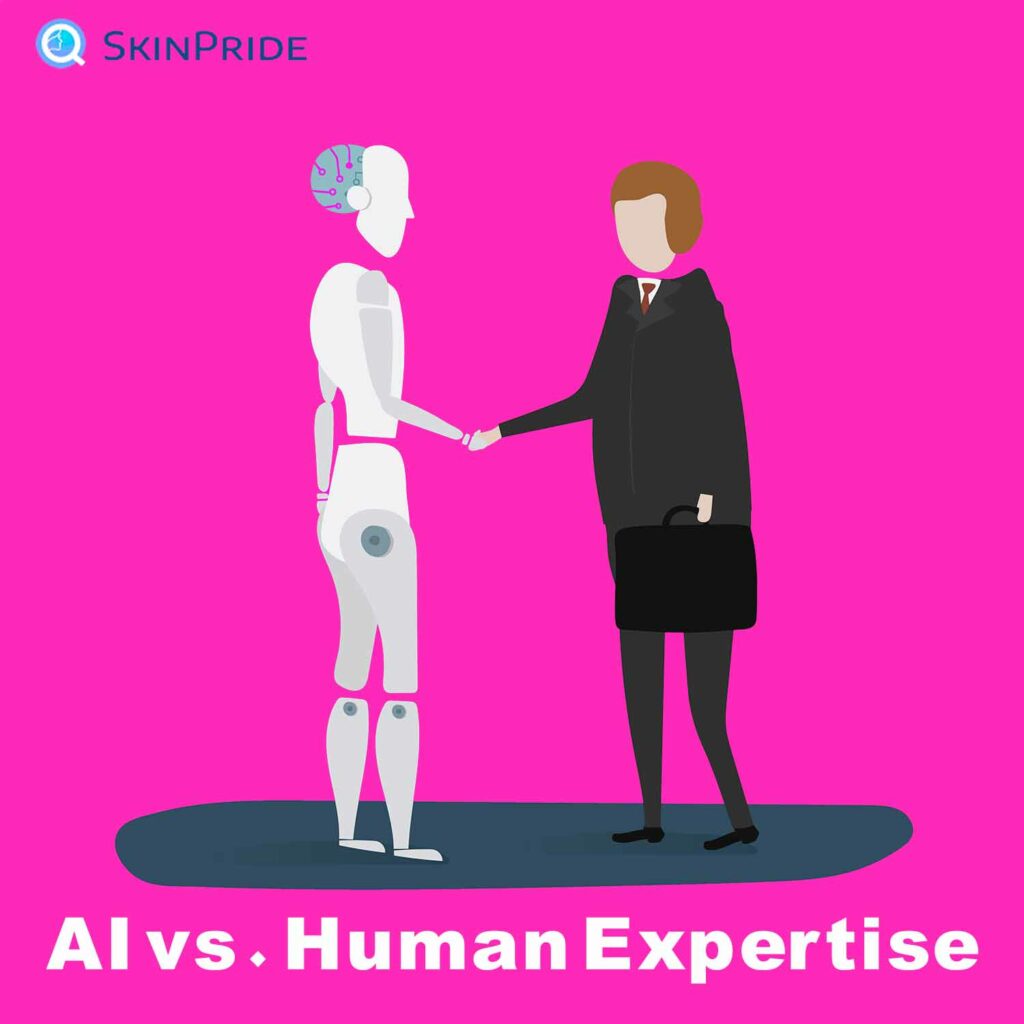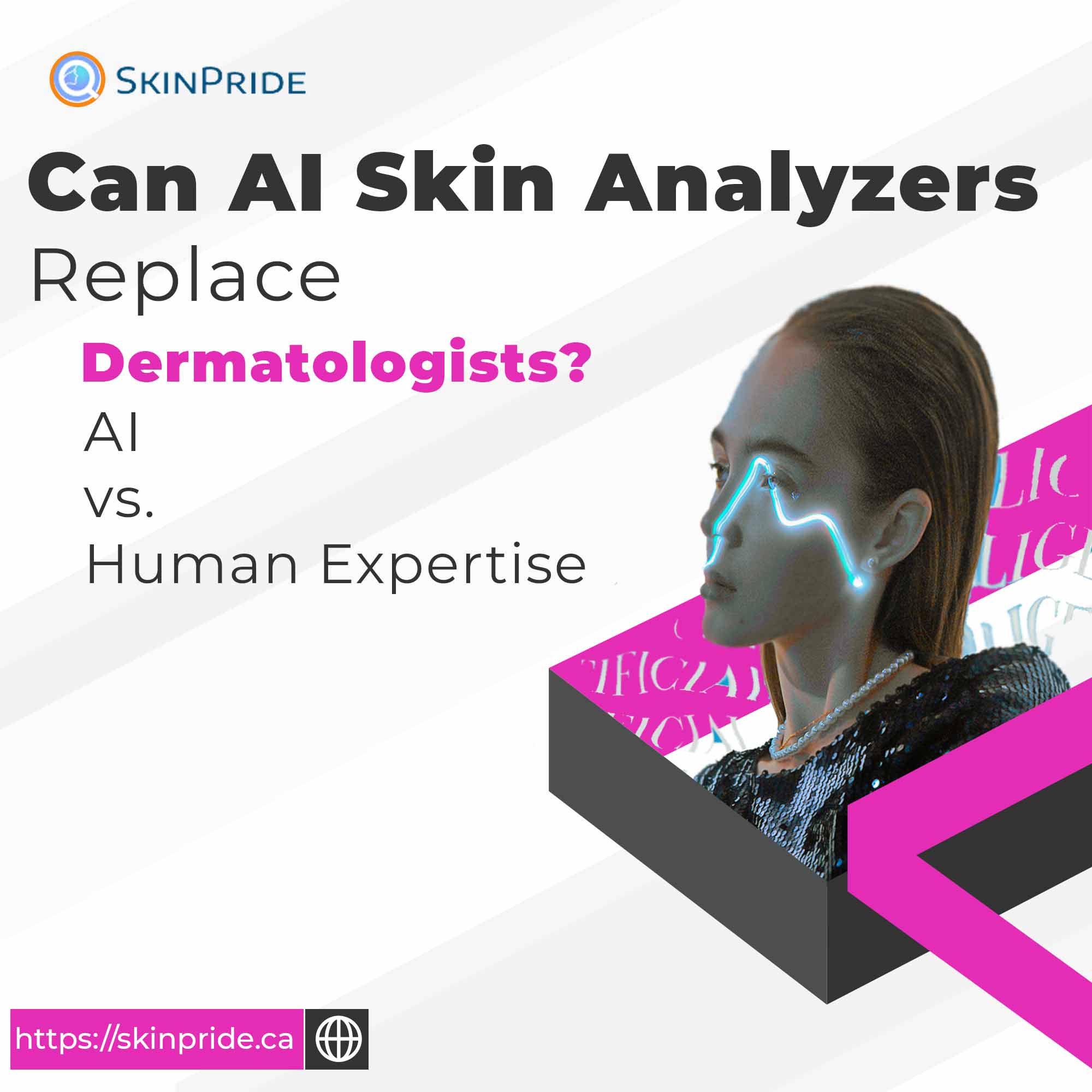Can AI Skin Analyzers Replace Dermatologists?
In today’s fast-paced world, technological advancements have seeped into every aspect of our lives, including skincare. The emergence of AI-powered skin analyzers has raised a crucial question: Can artificial intelligence replace human dermatologists’ expertise? In this article, we will explore the potential benefits and limitations of AI-enabled skin analyzers compared to traditional dermatologist consultations. AI-powered skin analyzers can provide a more accessible and affordable solution for those who cannot access dermatologist services.
However, AI-based tools are still in the early stages of development and are limited in their accuracy. Ultimately, AI-powered skin analyzers cannot replace the expertise of trained dermatologists. Skinpride is an AI-based application that provides automated skin analysis and personalized skincare recommendations. It uses machine learning algorithms and image recognition technology to detect skin concerns and recommend tailored skincare solutions. Skinpride provides valuable insights, but it cannot replace dermatologist expertise. However, dermatologists may not always be readily available, and not everyone can afford to see a dermatologist regularly. In these cases, AI-powered skin analyzers can be a useful tool for people to get insights into their skin health. Skinpride is an example of such an AI-powered skin analyzer, offering users personalized skincare advice and product recommendations. It can be a useful tool for people to track their skin health and take preventive measures against skin problems.
The Rise of AI in Skincare
A new era in skincare is being ushered in by artificial intelligence
In today’s fast-paced world, technological advancements have seeped into every aspect of our lives, including skincare. The emergence of AI-powered skin analyzers has raised a crucial question: Can artificial intelligence replace human dermatologists’ expertise? In this article, we will explore the potential benefits and limitations of AI-enabled skin analyzers compared to traditional dermatologist consultations. AI-powered skin analyzers can provide a more accessible and affordable solution for those who cannot access dermatologist services.
Artificial intelligence has made remarkable strides in skincare. AI-powered skin analyzers use advanced algorithms and machine learning to assess skin conditions. These applications have become popular due to their convenience and accessibility, allowing users to analyze their skin from their homes. AI-powered skin analyzers provide detailed insights into skin health, including insights into skin type, blemishes, wrinkles, and other skin features. This has revolutionized the skincare industry, allowing users to customize their skincare routine for optimal results. Furthermore, AI-powered skin analyzers can be used to keep track of the progress of skincare treatments. They can also help identify potential skin concerns and recommend appropriate treatments. Finally, AI-powered skin analyzers can provide personalized product recommendations for the user’s skin type.

Benefits of AI Skin Analyzers
-
1. Accessibility and Convenience Skin Pride
AI skin analyzers are available 24/7, allowing users to access skin analysis whenever they need it. This makes it much more convenient for users to get skin analysis without having to make an appointment or wait in line at a dermatologist's office. Additionally, AI skin analyzers are often more affordable than traditional dermatology visits. SkinPride App is an AI skin analyzer that allows users to take a picture of their skin and receive a personalized analysis of their skin concerns. With SkinPride App, users can get a comprehensive diagnosis of their skin and receive tailored treatment recommendations.
-
2. Early detection Skin Pride
These apps can detect subtle changes in the skin, potentially identifying skin issues at an early stage. This can help people get treatment before their skin condition worsens, leading to better outcomes and possibly faster healing. The apps can also provide reminders, ensuring people don't forget to do regular skin checks and apply sunscreen. The SkinPride app is one example of such technology. It uses AI to detect subtle changes in the skin, and it offers personalized advice and reminders. The app can also connect users to health professionals, ensuring they get the care they need.
-
3. Personalized recommendations Skin Pride
AI algorithms provide personalized skincare recommendations based on individual skin types and concerns. This enables customers to find the right products for their skin more quickly and easily. AI-driven skincare recommendations can also save customers money by avoiding costly mistakes when buying skincare products. AI skincare recommendations can also identify potential adverse reactions to a product, helping customers avoid using products that could be dangerous for their skin. Furthermore, AI-driven skincare recommendation systems can suggest new products that could benefit customers, based on their individual skin type and preferences.
-
4. Cost-effective Skin Pride
AI skin analyzers are often cheaper than regular dermatologist consultations. This can make it easier for those with limited financial resources to be able to access skin care services. Additionally, AI skin analyzers are more convenient as they can be done from home, saving time and money. Furthermore, AI skin analyzers are more accurate than manual examinations, as they use advanced algorithms to detect and analyze subtle changes in the skin. This can help to identify potential skin issues earlier and thus allow for more effective treatments. AI skin analyzers also provide more personalized advice and recommendations, as they can take into account a person's individual skin type and preferences. This can help people to find the best products and treatments to suit their skin needs.
Limitations of AI Skin Analyzers
-
1. Lack of Human Touch Skin Pride
AI analyzers lack the human touch and empathy dermatologists offer during consultations. AI analyzers cannot read into the patient's feelings, ask questions, or offer reassurance. The human touch is important in establishing a connection between doctor and patient, which is essential in providing a more accurate diagnosis and treatment plan. To bridge the gap between the human touch and AI analysis, SkinPride launched virtual consultations to provide patients with the same level of care as a dermatologist in a more convenient and affordable way.
-
2. Accuracy challenges Skin Pride
While AI algorithms are improving, they may still have limitations in diagnosing complex skin conditions. This means that AI systems are not yet reliable enough to replace the expertise of a dermatologist. Further research is needed to improve accuracy and reduce the risk of misdiagnosis. The SkinPride app is an example of an AI-based medical decision support system that can help dermatologists diagnose skin diseases. However, it is imperative to note that the app is still in its early stages and not yet ready for clinical use.
-
3. Inability to perform procedures Skin Pride
AI cannot perform the medical procedures or treatments that dermatologists can offer. AI may be able to diagnose skin conditions, but it cannot provide the expertise that dermatologists can offer. Furthermore, AI cannot provide personalized advice based on each individual patient's medical history and current needs. The SkinPride app is an example of AI-powered technology in the dermatology field, yet it should not be used as a substitute for a dermatologist. It can provide information to help people make decisions about their skin health, but it cannot replace the expertise of a dermatologist.
-
4. Cost-effective Skin Pride
AI skin analyzers are often cheaper than regular dermatologist consultations. This can make it easier for those with limited financial resources to be able to access skin care services. Additionally, AI skin analyzers are more convenient as they can be done from home, saving time and money. Furthermore, AI skin analyzers are more accurate than manual examinations, as they use advanced algorithms to detect and analyze subtle changes in the skin. This can help to identify potential skin issues earlier and thus allow for more effective treatments. AI skin analyzers also provide more personalized advice and recommendations, as they can take into account a person's individual skin type and preferences. This can help people to find the best products and treatments to suit their skin needs.
The Role of Dermatologists
Dermatologists are medical professionals with years of training and experience in diagnosing and treating skin conditions. Their expertise goes beyond what AI algorithms can currently offer. AI algorithms may be able to analyze skin conditions, but they will not be able to provide the same level of personalized care and treatment that a dermatologist can offer. Furthermore, a dermatologist can provide advice on how to prevent skin problems from occurring in the first place. Overall, dermatologists are essential to providing the best quality care for skin-related issues. They can assess a patient’s condition more accurately and provide more tailored treatment options. Furthermore, they can provide important insight into preventive measures to help prevent skin conditions from developing. For example, a dermatologist may recommend using a moisturizer with SPF to prevent sun damage and skin cancer or suggest avoiding certain types of skin care products or harsh chemicals that can cause irritation of the skin.
Benefits of dermatologist consultations
- 1. Expertise and diagnosis
Dermatologists can provide accurate diagnoses and recommend tailored treatment plans. Dermatologists can use their extensive knowledge of the skin, its diseases and treatments to correctly diagnose skin conditions and recommend the most effective treatments. They often have access to the latest technology and treatments that are not available to other healthcare providers, making them the best choice for those who need specialized care.
- 2. In-person Examinations
Physical examinations allow dermatologists to assess skin conditions comprehensively. Dermatologists can examine the skin more thoroughly by looking closely at the size, shape, colour, texture, and other factors of any rashes, bumps, or other skin irregularities. Additionally, they can perform tests such as skin biopsies, which may not be possible with other types of examinations.
- 3. Medical procedures
Dermatologists can perform various procedures, such as biopsies and surgeries, when necessary. These procedures can help diagnose and treat skin conditions, such as cancer, eczema, and psoriasis. Dermatologists can also prescribe medications to reduce inflammation and treat skin infections. Such procedures can help diagnose and treat skin conditions and provide treatment for a variety of skin conditions.
The Synergy of AI and Dermatology
Rather than viewing AI as a replacement for dermatologists, it is more productive to see it as a complementary tool. AI skin analyzers can assist individuals in monitoring their skin health and making informed decisions about skincare products. Dermatologists can then use this data to provide more precise and efficient care during in-person consultations. AI skin analyzers can also help detect signs of skin cancer and other common skin conditions, allowing individuals to get an accurate diagnosis and treatment plan at an earlier stage. This could lead to better outcomes and improved quality of life for those affected.
Conclusion
In the ongoing debate of AI vs. human expertise in skincare, it is clear that AI skin analyzers offer valuable benefits, such as accessibility and personalized recommendations. However, they cannot fully replace the expertise, empathy, and in-person examinations that dermatologists provide. The ideal approach is a collaborative one, where AI technology supports dermatologists in delivering the best possible care to patients.
FAQs
AI skin analyzers are becoming increasingly accurate but may not be as precise as dermatologists in complex cases.
AI analyzers can help in early detection, but a definitive diagnosis of skin cancer should be made by a dermatologist.
Some dermatologists incorporate AI tools to enhance their diagnosis and treatment plans.
AI analyzers can provide insights for various skin types but may have limitations in extremely rare conditions.
Regular dermatologist check-ups are essential, even if you use an AI skin analyzer, to ensure comprehensive skin health monitoring.

